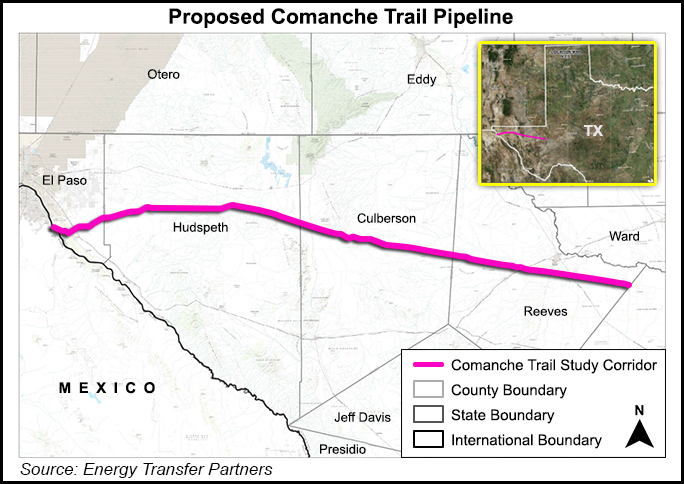Regulatory | Infrastructure | NGI All News Access | NGI The Weekly Gas Market Report
Comanche’s San Elizario Border Crossing Gets FERC Thumbs-Up
In a unanimous vote and without comment, FERC on Thursday granted a request for a presidential permit and authorization to site, construct and operate the 1.1 Bcf/d San Elizario Crossing Project, a border project in Texas that would export natural gas to Mexico via the proposed intrastate Comanche Trail Pipeline.

The San Elizario Crossing Project involves construction of a 42-inch diameter pipeline, measuring about 1,086 feet in length [CP15-503]. A horizontal directional drill (HDD) would lay the pipeline under the Rio Grande near the City of San Elizario, TX. The pipeline would have a maximum design export capacity of approximately 1.1 Bcf/d, and would transport natural gas to a new delivery interconnection near the City of San Isidro, in the Mexican state of Chihuahua.
The principal use of the proposed border-crossing pipeline would be to transport exported domestic natural gas for use as fuel in electric generation plants and industrial facilities in Mexico, according to Comanche Trail.
FERC previously said the project involves associated infrastructure that does not fall under its purview (see Daily GPI, Aug. 4, 2015). That infrastructure includes the proposed Comanche Pipeline, a 196-mile, 42-inch diameter intrastate pipeline that would originate in Pecos County, TX, and terminate at the proposed border crossing in El Paso County, the latter of which would be under FERC jurisdiction.
Construction of the San Elizario Crossing Project pipeline under the Rio Grande would affect a total of 4.2 acres of land in the United States, according to FERC. That total includes temporary workspace for the HDD process and hydrostatic testing of the pipeline. After construction is complete, Comanche Trail would retain 1.3 acres as a 50-foot wide easement.
The project is one of several designed to provide Mexico with additional supplies of natural gas, especially for power generation purposes (see Daily GPI, May 9). Earlier this month, FERC issued a presidential permit authorizing international border-crossing facilities near the city of Presidio in Presidio County, TX, and the Mexican city of Manuel Ojinaga in the state of Chihuahua for the Trans-Pecos natural gas pipeline.
© 2024 Natural Gas Intelligence. All rights reserved.
ISSN © 1532-1231 | ISSN © 2577-9877 | ISSN © 1532-1266 |
